In 2008, a few of us took an illegal trip to Cuba for the Decimotercero Festival Internacional de la Poesia, a plein air annual poetry festival in Havana, Cuba. I say “illegal†because the US Presidents George grande y el chico, were sticking to the strict rule of penalizing US citizens [who traveled to Cuba without permission] with a $10,000 fine.
At that point many artist and musician friends had been going back and forth all this time, to visit and attend the historically rich music, art and cultural events sponsored by the Cuban government. Their stories made me salivate with desire to follow their footsteps. After all, we are not people to be held back from where we want to go, because of some ridiculous rules and regulations.
When some local eastside poets got invited to go to this poetry festival in 2008—I latched my wagon onto theirs. Calls were made to the Cuban festival organizers from Tijuana about accommodations, schedules, side cultural trips, todo—and we were all set. Hopping over, on one of Mexico’s daily flights to Cuba still had its risks, because the US could request Mexico’s flight manifestos where our names would be listed and we would be so busted. Ni modo.
I wanted to see Cuba before Castro died, before it changed into another commercial beach resort dotted with European style hotels. It could happen! So here are my photos. Photos I was too afraid to share with you on LAeastside in 2008—because I did not want to be caught for doing this supposedly un-American thing. My courage comes from Obama easing the penalties on Americans traveling to Cuba a few weeks ago and legitimate flights being organized for non-profits to go to Cuba from the USA on cultural exchanges. Yay!
Poets from all over the world gathered each day at a gorgeous cultural center in Havana, who’s grounds and building looked like a wealthy estate, marble spiral staircase and all. My traveling companion quipped, “There must be some angry family living in Florida, who got thrown out of here!”
Poetry was recited in everyone poet’s native language—from South American indigenous languages to European: Spanish, English, Italian and French. You didn’t have to know what was being said, because the intonation, rhythm and presentation translated its meaning.
The festival lasted a few weeks with different venues, from small community spaces to the Havana Cathedral. The Caribbean poetry evening began with lots of drumming and a traditional Yoruba spiritual dance blessing.
Of course, the poetry of El Caribe brought it home for me, as well as our eastside poets. No kidding, our ELA orators were so captivating, that their faces would be all over the Cuban TV when we got to our hotel at night.
Old Havana is one of the most charming areas. There is restoration going on to keep the original flavor and color of its colonial architecture and walking-only paver streets. It is a bit touristy–but we got the most delicious coffee jolt there each day con panquesito. There’s nothing like a shot of Cuban coffee espresso.
And. . . . it’s true about the cars in Cuba being in a 1950’s revolution time warp. There are so many mid-century models cruising all over the place–you feel like you are in a car club’s wet dream. I took this picture walking to our bus.
One of our stops was to a print studio, very much like Self Help Graphics. It was a cooperative, where artists could use the presses to print and take classes on printing too. Above is the print sales room. Striking color and design aesthetics of the region distinguished these prints. They reminded us very much of Los de Abajo Print Collective work.
About 40 minutes outside of Havana, we visited a handmade book making studio. They made limited editions of less than 100. Since this was a government run artist studio, we could only use Cuban money to make purchases . There is one currency available to tourists (especially Americans) and it is sold for a higher price than Cuban currency which is used solely by the Cubans and their allies. Wouldn’t you know that one of our ELA poets had some of the Cuban currency? He must have looked local. He bought us each 4 handmade, hand painted, intricate constructed, limited edition books for $1 each. Wow! That’s the type of artistic craftsmanship that only a government sponsor could support.
By one of the swanky hotels, where some of the poets stayed, not us though—there was this ice cream cafe. Under the Che icon, we enjoyed our helado break. Near our modest hotel, was a bus terminal. Soon our ELA entourage discovered that they could score rum in containers that looked like juice boxes—inexpensively at that bus terminal. Each night, we sat on the hotel stoop, drinking rum out of juice boxes, while the poets performed personally on the fly. Other hotel guests, some of the neighbors and hotel employees joined in our homestyle hanging-out each night. We laughed, drank, met new friends, listened to poems and gossiped about who at the festival had hooked up romantically that day.
It was refreshing to see a country with no commercial signs, ads, bill boards anywhere. No liquor stores, no grocery stores, no take out joints, no 99Cents Only places—-nothing that is about ‘buying, buying, buying”. You could actually enjoy the scenery without having to digest some sort of sales offering. When those discrete beggars got close to you, they’d ask in a whisper “tienes caramelitos?”/do you have candy? I was there, I witnessed it, I have my memories.
In Old Havana, in one of the government run galleries (in fact, this one above)—I exhibited my art work to some curious locals who looked deeply and thoughtfully at each piece.

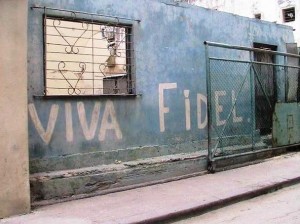
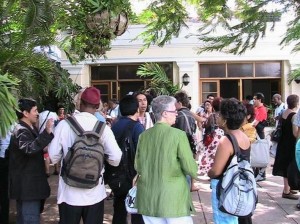
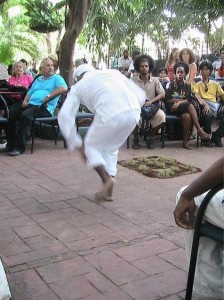
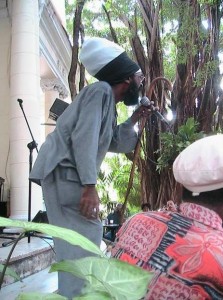
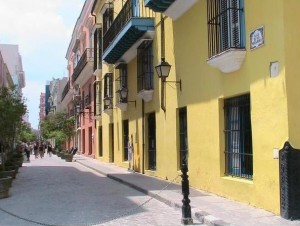
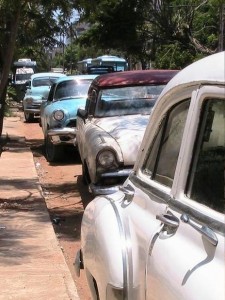
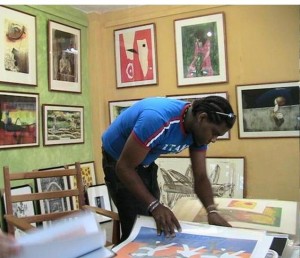

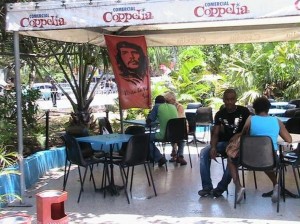
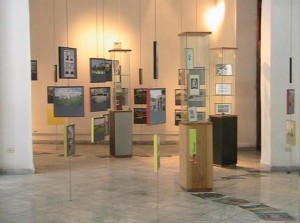
I can’t go, Migdia. There’s an embargo. That would be a violation of federal law. You do believe in the rule of law, don’t you? We need Cuban-Americans like you to voice your disagreement with the embargo, so that there will be political pressure to change it. Until then, I can’t see Cuba for myself, and therefore I’m forced to choose between your description of Cuba, and Victoria’s. I choose Victoria’s. Sorry. She just seems more genuine, less agenda driven. But maybe one day the embargo will be lifted, and I can see Cuba for myself, and see if you’re telling the truth. Until then…
By accident, I came across this information. I have to finish my work now, so I will not be back. However, for those of you who are interested in history, here’s what Castro said during the Missile Crisis and the appropriate link — there are, obviously, other relevant sources available on the Internet ofr the library. Make of it whatever you wish. Meanwhile, I wish you all well. Peace. Migdia —
http://www6.miami.edu/iccas/FidelontheUS-Hans.pdf
“I wrote a letter [on October 26, 1962] to Khrushchev to give him courage. It was my opinion that, in case of an invasion, it was necessary to launch a massive and total nuclear strike [against the United States]…If they invade…one should not waste time…nor give the enemy the time to launch the first strike.8
• [Nikita Khrushchev, on Fidel Castro during the Cuban Missile Crisis:]
Castro suggested that in order to prevent [the Soviet] nuclear missiles [in Cuba] from being destroyed, we [the Soviet Union] should launch a preemptive strike against the United States. He concluded that an attack was unavoidable and that this attack had to be preempted. In other words, we [the Soviet Union] needed to immediately deliver a nuclear missile strike against the United States.
At one point, Castro ordered our [Soviet] antiaircraft officers to shoot down a U-2 reconnaissance plane.
I [Nikita Khrushchev] talked with him [years] later too, after he had already been to the Soviet Union twice and was in a different frame of mind…We discussed the past from hindsight and conducted an analysis of the events in a calm atmosphere. I saw that he still did not understand.
I told Castro, “There is another aspect to this business. You wanted to start a war with the United States. If the war had begun we would somehow have survived, but Cuba no doubt would have ceased to exist. It would have been crushed into powder. Yet you suggested a nuclear strike!†9
http://www.imdb.fr/title/tt1821327/
http://www.imdb.com/video/wab/vi3321207577/
“anonymous (street meat)” A film by Migdia Chinea – UCLA TFTDM and Ciboney Productions
U.S. contractor sentenced to 15 years in Cuban prison
By the CNN Wire Staff
March 12, 2011
(CNN) — American contractor Alan P. Gross has been sentenced to 15 years in prison for crimes against the Cuban state.
Gross, 61, was found guilty of working on a “subversive” U.S. project intended to undermine the Cuban government by distributing illegal satellite communications equipment, according to Cubadebate, a state-run website in Cuba.
The United States has said that Gross was helping the island’s small Jewish community connect to the Internet.
The verdict comes on the heels of last week’s two-day trial in Havana. The Cuban prosecution had been asking for a 20-year sentence.
“The Gross family is devastated by the verdict and harsh sentence announced today by the Cuban authorities,” defense attorney Peter J. Kahn said in a written statement. “Having already served a 15-month sentence in a Cuban prison, Alan and his family have paid an enormous personal price in the long-standing political feud between Cuba and the United States.”
Kahn pledged to “continue to work with Alan’s Cuban attorney in exploring any and all options available to him, including the possibility of an appeal.” He has called for the contractor’s immediate release on humanitarian grounds.
U.S. National Security Council spokesman Tommy Vietor quickly responded to Saturday’s ruling, saying that it “adds another injustice to Alan Gross’s ordeal.”
“He has already spent too many days in detention and should not spend one more,” Vietor said. “We urge the immediate release of Mr. Gross so that he can return home to his wife and family.”
Gross’ wife, Judy, attended the trial with her attorney. Three U.S. officials also attended as observers. His mother has recently been diagnosed with lung cancer and their daughter is recovering from a double mastectomy.
Gross has been held at the high-security Villa Marista prison after being detained at Havana’s international airport in December 2009.
U.S. Secretary of State Hillary Clinton told reporters Friday that Gross had been “unjustly jailed for far too long.”
“He needs to be able to leave Cuba and return home,” Clinton said. “This is a matter of great personal pain to his family and concern to the U.S. government.”
His detention and subsequent sentencing have brought tentative efforts by both countries to overcome years of hostility to an apparent standstill.
Gross had been working for Development Alternatives Incorporated, a Maryland-based subcontractor that received a multimillion-dollar U.S. contract for democracy building efforts on the island nation.
He had repeatedly traveled to Cuba using a tourist visa.
“We are profoundly disappointed by today’s verdict and sentence,” said DAI President and Chief Executive James Boomgard.
“Alan Gross has been accused of doing nothing more than giving peaceful people access to the internet,” Boomgard said, adding that his detention has been “without the benefit of due process and in violation of international law.”
Boomgard has asked Cuba “in light of the critical medical situation confronting Alan and his family” to release Gross on humanitarian grounds.
Last year, the topic of Gross’ imprisonment prompted one of the highest-level diplomatic exchanges between the two countries in recent years.
During the U.N. General Assembly in New York, U.S. Assistant Secretary of State Arturo Valenzuela spoke with Cuban Foreign Minister Bruno Rodriguez in a meeting intended to “encourage the release” of Gross.
Cuba is one of a handful of places — including Iran and Myanmar — where the U.S. funds what it calls democracy-building initiatives without the host country’s permission.
That’s rich, Migdia, as congressman Peter King holds hearings here in America to throw Muslims in prison for what he at least perceives as “crimes against America”, based solely on them being Muslim in and of itself. Should tourists stop visiting America to protest Peter King’s fascism, or should they appreciate the good in America and realize King’s fascism is only a part of what we represent?
No no no RT, the issue at hand is Cuba… reaching for straws and relativity does nothing to prove your point.
http://youtu.be/UP2cYqmESrM
http://www.nytimes.com/2011/07/06/books/yoani-sanchez-cubas-voice-of-a-blogging-generation.html?hp#
Yoani Sanchez new book on Cuba — a must read for those who plan to go there in spite of Cuba’s violations of human rights.